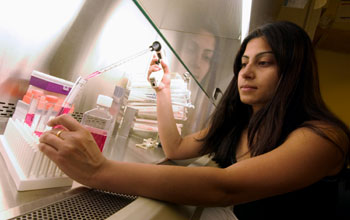 Priyanka Rohatgi is one of the researchers learning how to commandeer the complex machinery that cells use to recognize and respond to such important molecules as steroid hormones, thyroid hormones and vitamin D.
Priyanka Rohatgi is one of the researchers learning how to commandeer the complex machinery that cells use to recognize and respond to such important molecules as steroid hormones, thyroid hormones and vitamin D.Photo from the National Science Foundation
While the general public is largely unaware of the the importance of microbiology, it is a crucially important field of science. Molecular and cell biology is important not only for the understanding of human, animal and plant diseases, but more generally of all living organisms. Microbial processes have important industrial applications, from the food industry to mineral beneficiation to pharmaceuticals. Understanding soil organisms is critical for agriculture, and indeed offers great promise for bio-remediation of damaged environments. While major advances have been made in microbiology, and in microbiological technologies in developed nations, the developing world has lagged seriously.
UNESCO has played an important role in building microbiological capacity to serve developing nations. That role is relatively under-appreciated given the health and economic benefits it will yield in the long run.
UNESCO's Molecular and Cell Biology Network
The major goal of MCBN is to provide opportunities to developing and restructuring countries to attack local and regional problems by utilizing methods of molecular and cell biology. MCBN is a not-for-profit association and a non-governmental organization (NGO) supported by UNESCO. UNESCO's Basic Science program has been working with MCBN for more than a decade.
UNESCO's Microbial Resources Centers (MIRCENs)
The MIRCENs are academic/research institutes in developed and developing countries which network in a global collaborative effort to promote international scientific co-operation on microbiological research and biotechnological applications for the benefit of humankind. Since 1975 and in partnership with the United Nations Environment Program (UNEP), and the United Nations Development Program (UNDP), 34 Microbial Resources Centres (MIRCENS) have been established worldwide.
No comments:
Post a Comment